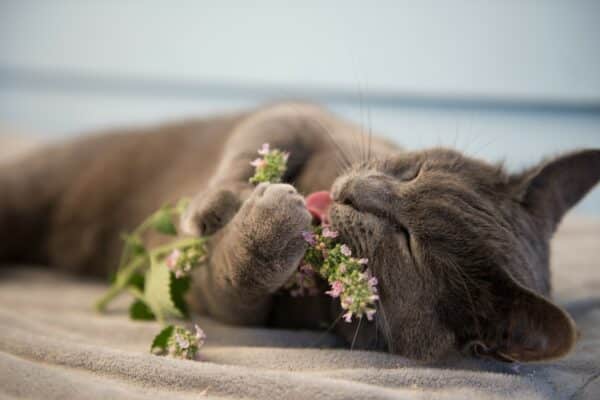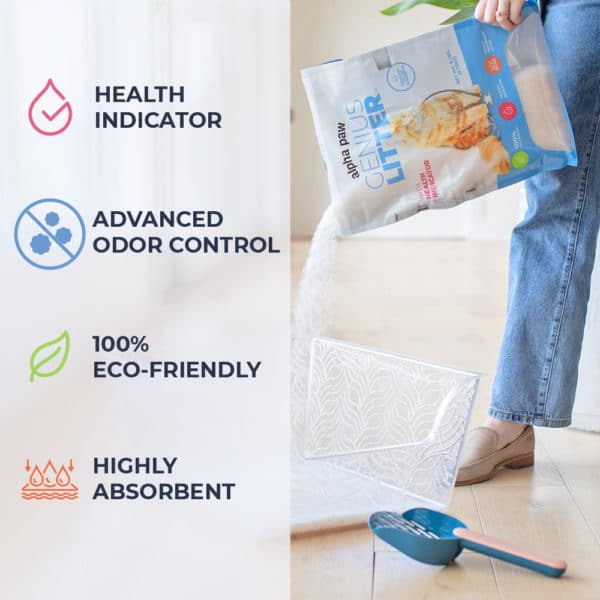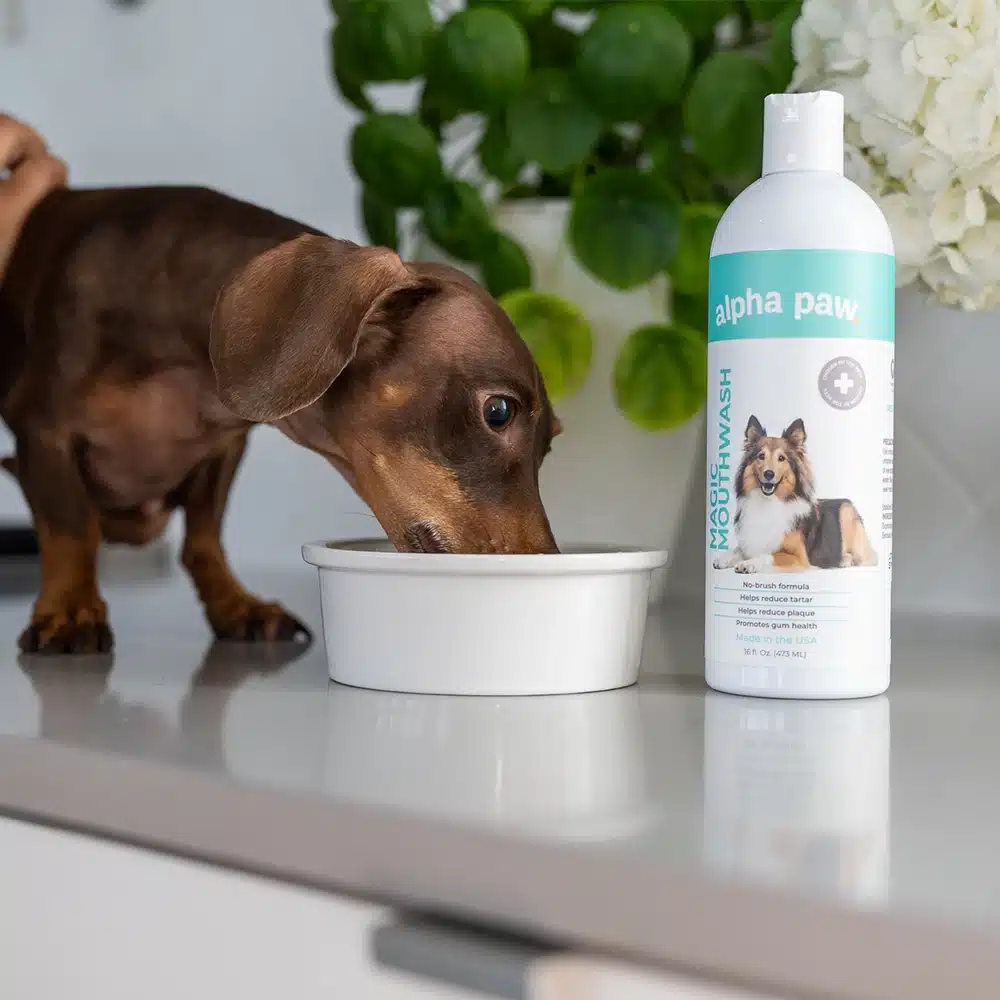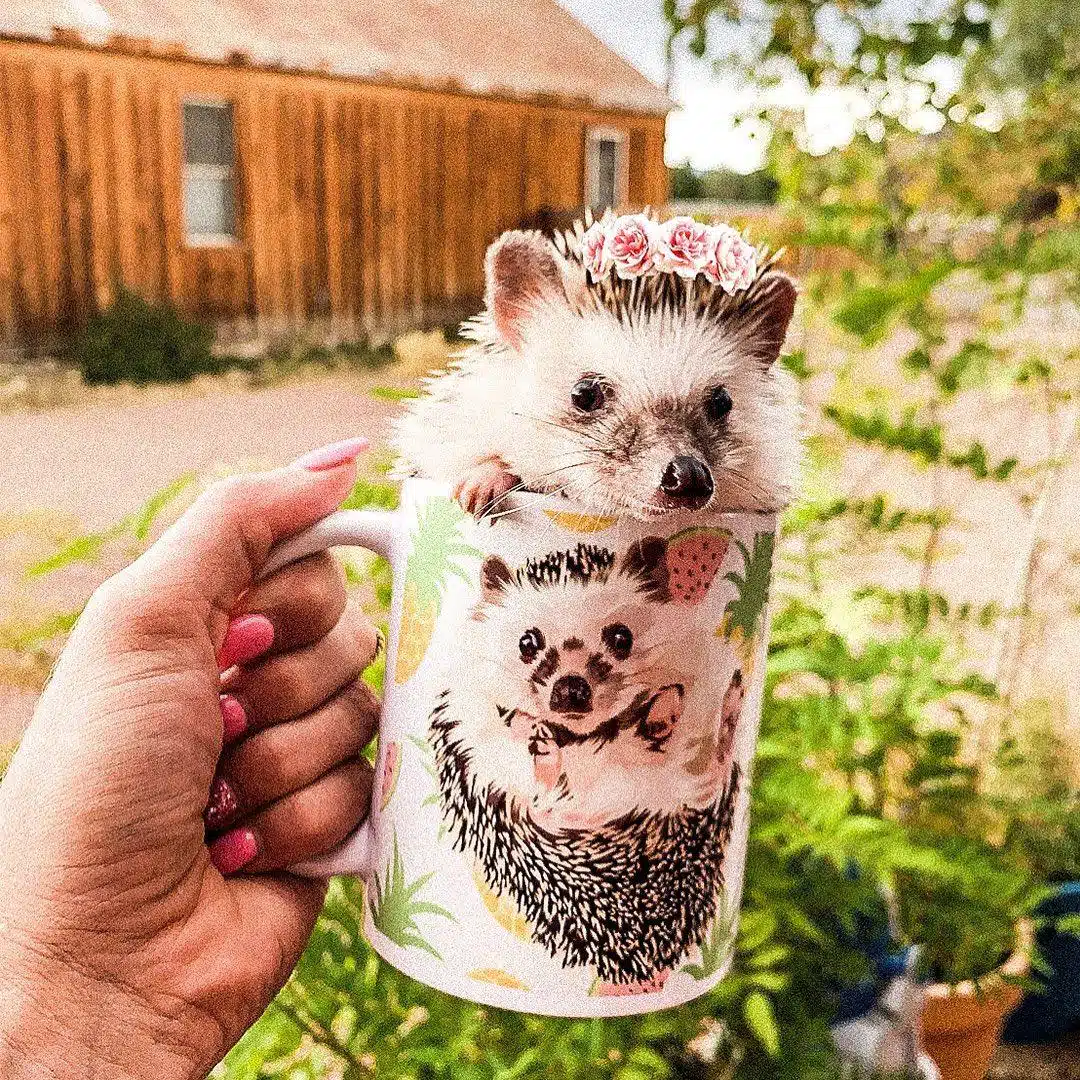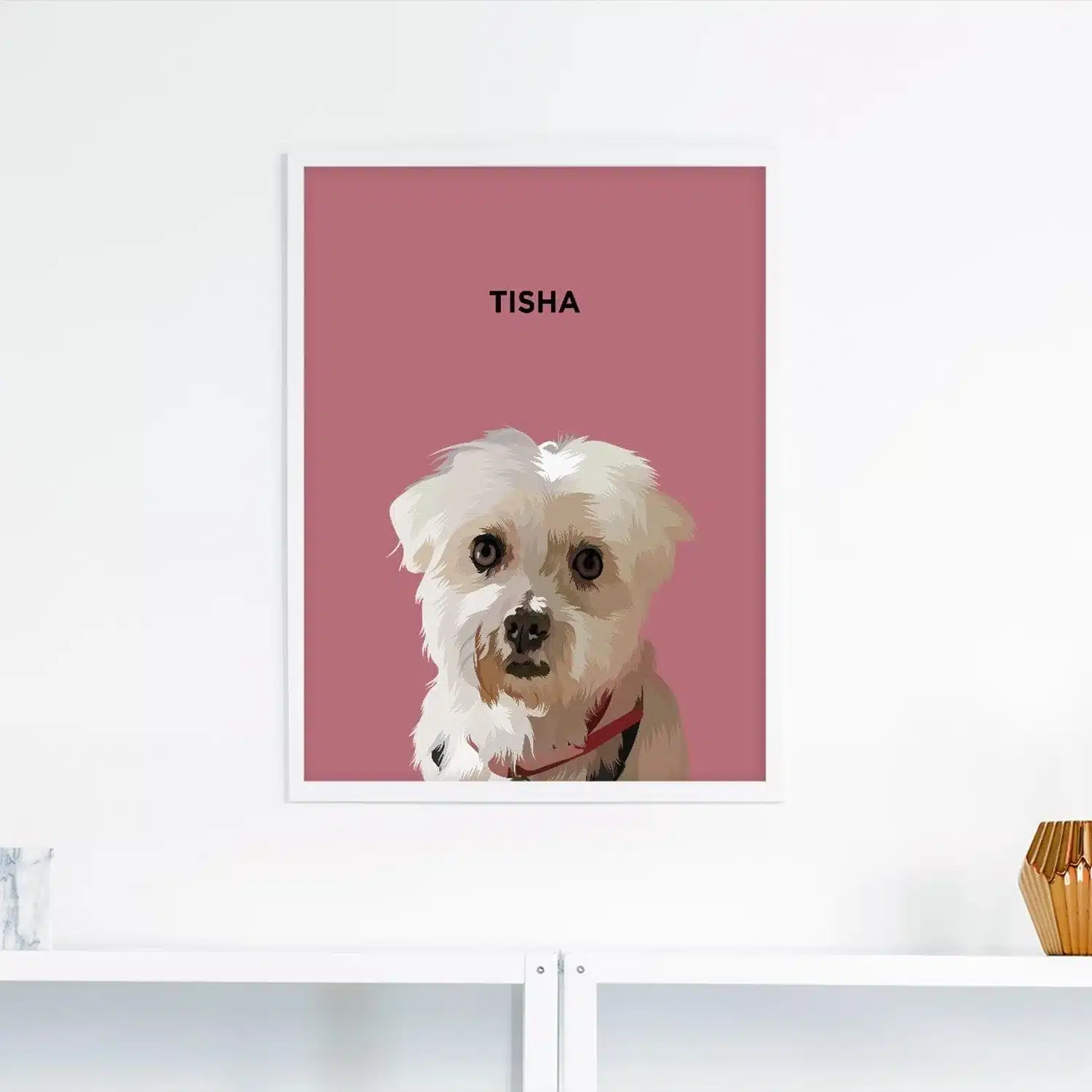Cats and catnip go together like peanut butter and jelly, fish and chips, or bacon and eggs (don’t worry vegetarians).
Most cats absolutely love catnip!
It’s one of their favorite scents, and they’ll do just about anything to find it, including jumping around in circles, rolling on the floor, attacking stuffed animals, and generally acting more than a little silly.
But can cats eat catnip? And what exactly is this leafy green plant that has such an impact on your feline friend?
Let’s find out!
What is Catnip?
The Nepeta cataria plant is known as catnip, catswort, catmint, and catwort. Catnip plants are native to Europe, Asia, and Africa and are members of the mint family.
Today it is available almost anywhere in the world and is popular in herb gardens and can grow wildly as a weed.
What is the Mechanism of Action of Catnip?
Scientists believe that nepetalactone is what gives catnip its magic. Nepetalactone is a chemical in the mint family and when it interacts with a cat’s sensitive olfactory system; it releases neurotransmitters that have an effect on their behavior.
In other words, catnip makes cats crazy! This may not sound like something you want to try with your cat(s), but you should at least be able to identify common varieties of catmint so you can educate yourself about whether or not these plants pose any danger to your cats.
Does Nepetalactone Impact Feline Pheromones?
It’s widely known that catnip stimulates pleasure and reactivity in felines. But, does it actually get cats high, and is there evidence to support how exactly catnip works on feline brains?
Research says, yes. It turns out nepetalactone is an analog of a feline pheromone that affects their emotional response. So technically, cats are tripping balls when they smell or eat catnip! In fact, studies show that nepetalactone mimics feline pheromones that influence courtship and breeding behaviors.
Can Cats Eat Catnip?
Yes, your kitty can eat some catnip! Catnip is not toxic for your furry friend and is safe to consume.
But it’s not real cat food and is not a snack or treat for your pet. Catnip just serves as a stimulant that can regulate your kitty’s behavior.
If your cat seems to have taken an interest in your house plants, that’s a sign he may need some catnip!
Does Catnip Provide Any Nutritional Value for Cats?
Catnip is a plant that can have some positive effects on cats, but it has no nutritional benefits for them.
Catnip is mostly fiber and cats cannot digest it because they are obligate carnivores.
Catnip doesn’t provide any valuable nutrients to your pet and won’t do anything to contribute to the nutrition that it receives from the food you feed it.
Can Catnip Be Used to Regulate Behavior?
Yes, catnip is an effective behavior regulation tool. There are several behavioral conditions cats experience that cat owners find can be mitigated with a dosage of catnip.
One popular reason for using catnip is to encourage trainability in kittens and adult cats, as well as reduce lethargy and control hyperactive cats.
In some cases, having a new member around can affect the sleeping habits of other felines in your home. Fortunately, introducing your cat to catnip will help regulate sleeping habits among family members.
Cats Might Experience the Following Patterns When in Contact With Catnip
Inhaling
The scent of catnip will immediately attract cats, and because they have a keen sense of smell, they will respond strongly when they find the active nepetalactone in catnip and breathe it in quickly.
Chewing and Ingesting
To prolong the initial experience of euphoria, many hyped cats consume a mouthful of catnip after snorting it.
Rubbing and Rolling
Some cats will rub catnip on their fur and skin and then roll around on the floor to show typical mating behavior.
When Cats Inhale Catnip, What Happens?
Catnip is a plant that can affect your cat in many different ways. Mostly, when your cat inhales the plant, it will behave more pleasantly and experience a feeling of euphoria.
However, there are some instances where it will result in negative behavior or reactions in cats as well. The behavior may start as early as 5 to 15 minutes after inhalation and will be gone within 25 to 30 minutes.
The most likely signs of inhaling catnip might be:
- Rolling
- Flipping
- Rubbing
- Running
- Jumping
- Meowing
- Behaving wildly or running wildly.
What Does a Cat Feel Like After he/she Eats Catnip?
For most cats, eating catnip will make them feel mellow or sleepy and some may experience a mild sedative effect, leading to relaxed behavior, purring, drooling, and dozing off after ingesting the herb.
The effect of eating catnip can take a little longer time than inhaling because it must be digested in order to enter the bloodstream.
Cats that eat enough of the plant will usually experience its effects for 2 to 3 hours depending on the individual animal.
Fresh Catnip is Safe for Cats, Right?
Yes, cats can eat fresh catnip but in small amounts. Fresh catnip contains high amount of nepetalactone that acts as a stimulant for your kitty’s central nervous system.
While it is safe for your furry friend to consume a little bit of fresh catnip, too much of it could make him sick.
If you want to give your cat some fresh catnip, make sure you monitor him so he doesn’t eat too much at once or consume any other substances that may be harmful to his health.
Are Catnip Leaves Safe For Cats To Consume?
Yes, it is safe for cats to eat catnip leaves. In fact, many felines love to munch on fresh or dried leaves of catnip. However, the dosage can be set as high as 10-20 grams, it should never be more than this.
Can Cats Eat Catnip Flowers?
The flowers of catnip contain a high concentration of nepetalactone and are usually more potent than the leaves. The consumption of catnip flowers is safe for cats; however excessive intake should be avoided. Your pet should be supervised whenever around catnip flowers to avoid this danger.
When it Comes to Dried Catnip Plants, Can Cats Eat Them?
There are several ways to use dried catnip leaves in your home with your pet. The most popular way is to sprinkle the leaves around the house for your pet to find and enjoy in their own way.
A second option is to sprinkle some of the powder in a toy or toy box for interactive playtime with your pet.
The amount of catnip your cat can eat varies depending on the weight and health of your cat, but the average dosage is around 1 teaspoon.
How Does Catnip Affect Pregnant Cats?
Many veterinarians and animal behaviorists believe that eating catnip may affect a pregnant cat’s uterus and placenta since catnip has a uterine stimulant effect. The health of her litter can be compromised as well.
Catnip is not an essential part of a cat’s diet and is not necessary for pregnant females to maintain good health or sustain their pregnancies. This means that pregnant cats should avoid exposure to this herb.
Can Kittens Eat Catnip?
Kittens have not yet developed sensory receptors and it takes around 5-6 months for them to develop these.
When a kitten inhales the scent of catnip, it does not have any effect because the kitten has not developed the sensory receptors for that specific odor yet.
However, it is always advised that one does not give treats or herbs like catnip to kittens as they need animal-based proteins for proper growth and development.
When Catnip is Consumed in Excess, What Happens?
Your furry friend’s health can suffer if he/she consumes excessive amounts of catnip. Catnip is a plant and it is full of fibers that the digestive system of a cat cannot break down and process properly which can lead to gastrointestinal problems if eaten in excess.
Gastrointestinal problems may include some of the following signs:
- Vomiting
- Diarrhea
- Bloating
- Loss of appetite
- Abdominal pain
- Constipation
- Compromised digestion
Is it Possible for Cats to Have an Allergic Reaction to Catnip?
The plant may also cause allergies in a small percentage of cats. An allergic reaction is characterized by the following symptoms:
- Runny nose
- Swollen eyes
- Diarrhea
- Itchy skin
- Unnatural stool
- Vomiting
- Coughing or wheezing
If Your Cat Shows Symptoms, What Should You Do?
If your cat shows signs and symptoms of catnip, you might consider taking it to a veterinarian. The vet will need to perform several tests on your cat—and on her poop—to figure out what’s causing these problems. Then, she can prescribe a safe course of treatment for your feline friend.
Alternative Healthy Snacks for Cats
Protein snacks like small bits of cooked chicken or a small serving of tuna will provide your cat with nutritional benefits.
There are a lot of protein snacks available to choose from:
- Tuna
- Chicken
- Cooked eggs
- Sardines
- Lean beef
- Lamb
- Shrimps and prawns
- Salmon
- Mackerel
Key Takeaways
- Your furry friend can enjoy catnip, but excess can be harmful.
- The effects of inhaling catnip differ from those of eating it.
- Your cat will not gain any nutritional benefits from catnip.
- It’s possible that your cat might be allergic to catnip.
- Your furry friend can suffer from digestive problems when eating too much.
- Always consult your vet before giving your cat any new food.
Pro Tip:
It can be very stressful and concerning when a beloved pet is not feeling well, so it’s worth it to get pet insurance to make sure you can cover the veterinary bills.
Importance of Pet Insurance
Pet insurance is a great way to protect your animal’s health. It can be hard to predict when an accident will happen, but with pet insurance, you’re covered.
There are a few different types of plans depending on your needs, and it only takes minutes to get coverage for your pet.
Some pet insurance companies will even cover 100% of veterinary expenses. So make sure to choose the best pet insurance plan for your furry friend.
Once you have a plan in place, vet bills will never be too high because they’ll already be covered by the policy.
It’s important that we all take care of our animals’ safety and well-being so they can enjoy their lives just as much as we do ours.
What Makes Genius Litter Different from Ordinary Litter?
Say goodbye to hauling heavy bags and hello to easy Genius Litter.
With our innovative non-clumping litter formula, you’ll need less of it. One bag of our disposable Genius Litter lasts up to a month, so you won’t need to refill the box as often and can save money on monthly costs.
One thing that separates us from traditional litter is that Genius Litter changes color to indicate when your cat has a potential health issue, so you can get them help before it becomes an urgent medical situation.
All you need to do is set up a delivery date with us each month, and rest easy knowing that Genius Litter will arrive at your doorstep every 30 days.
For a convenient solution for your cat, try Genius Litter today!
Why is Lysine so Important for Your Pet?
Protect your pet’s immunity!
Have you noticed that your cat is coughing, sneezing, and having rapid breathing? Or maybe he/she has been scratching more than usual?
These are all signs of a weakened immune system. One way to prevent this from happening is by using lysine supplements.
Lysine plays a key role in your pet’s immunity because it helps to regulate the immune system.
Without enough lysine, your pets will be more susceptible to illness because their immune system can’t fight off infections as efficiently.
When they are sick, they will also be less able to absorb nutrients and make use of other supplements that can help them feel better.
Give your pet the support they need. Our Lysine supplement provides essential amino acids to help support a strong immune system.
Order now to get 300 one-scoop servings or 150 two-scoop servings and don’t worry about expiry!



